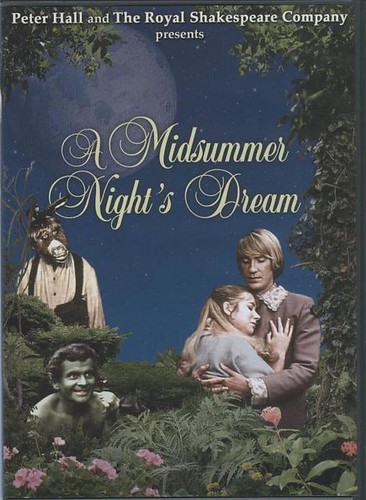 Welcome back to unofficial Shakespeare week. Let's talk about A Midsummer Night's Dream. It's about 1000 kinds of ridiculous: fairies, broken hearts, love potion, a donkey-man, and a play within a play. But how does one make it more ridiculous?
Welcome back to unofficial Shakespeare week. Let's talk about A Midsummer Night's Dream. It's about 1000 kinds of ridiculous: fairies, broken hearts, love potion, a donkey-man, and a play within a play. But how does one make it more ridiculous?1. Mismatch male and female costumes. Put the men in vaguely period attire and attach swords. But the women, they must sport 60s dresses with mid-thigh hems and a pair of boots. Also, they must also do nothing with their hair that would be anything but mod.
2. The fairies, let's make them dark green and mostly nude. Except for the children. They can have some clothes.
3. And fairies must move all magically...pray, let's speed up the film slightly and then proceed to record the speech in post-production, but obviously not quite match up the lips. In fact, let's do that to all the speech.
4. And you know what would give it that extra magical feel? Film it on location in a dark, dank forest with extra mud. That way, everything will be the same brown and dark green color.
5. And let's match this minuscule production design budget with world class actors of the Royal Shakespeare Company and get Peter Hall to direct it.
Thus came about the 1968 television adaptation of A Midsummer Night's Dream. It's mostly successful at being entertaining, seeing as how legit actors are delivering their lines like they know what they're saying. It also helps that much of the dialogue is spoken swiftly (one of the benefits of a Shakespeare comedy over a tragedy as they're not trying to make things important by how long it takes them to say something).
Plus, did I mention Judi Dench plays the mostly nude Queen of the Fairies and Helen Mirren is Hermia? Although I believe both of them are upstaged by the unsettling yet awesomely intense performance by Ian Richardson as Oberon the King of the Fairies. Honestly, it's like he was the inspiration for Gene Wilder's Willy Wonka, it is that weird/great.
I'm not sure I can say anything else about how incredible this production is. Do yourself a favor and just watch some highlights of Judi Dench (but look out for Ian Richardson's eyes and the psychedelic editing job):
I hope your brain didn't just explode because now I'm going to talk about the pretty awful (and not in a fun psychedelic way) ShakespeaRe-told version. It's something I would expect to see on ABC Family. I'm not even kidding when I tell you I would rather watch My Fake Fiance again because at least Melissa Joan Hart and Joey Lawerance know they're in a crappy made for TV movie and are fully embracing the tragedy that their respective careers have become (you can see it in their eyes).
The updated version of A Midsummer Night's Dream, however, fails to be whimsical and fun. It kind of loses the magic in all its modernity. The night takes place at a holiday camp in which an engagement is broken off and then lovers are mixed up by love juice (oh, Puck). One odd choice is having the fairies and the mortals interact. Well the father and Oberon do at least, which leads to a superfluous and dorky plot line about bringing the romance back into a long marriage that I guess replaces the play within a play at the end.
 Let's all just admit that Oberon is the best part of any adaptation. This time Lennie James got to rock this role.
Let's all just admit that Oberon is the best part of any adaptation. This time Lennie James got to rock this role.Helena (Michelle Bonnard) comes off the best in this adaptation because she's less desperate and more sympathetically in love with James (William Ash in the updated Demetrius role). Although taking Helena seriously makes things much more cheesy than outrageously funny. This version also allowed me to see my favorite mambo dancing footballer and mistaken identity brother to the screen (William Ash and Rupert Evans), neither of which are that great of actors, they're mostly just nice to look at. Also, having the donkey-ified dude (Johnny Vegas) do a bad imitation of David Brent's awful/awkard dance from season 2 episode 5 of The Office somehow got a laugh out of me, it was so meta.
Final word: Find the 1968 version on Netflix instant play now. If you're up for it, the Re-told version is on there, too, but I'd probably watch to find My Fake Fiance first. (Found here. You're welcome)
No comments:
Post a Comment